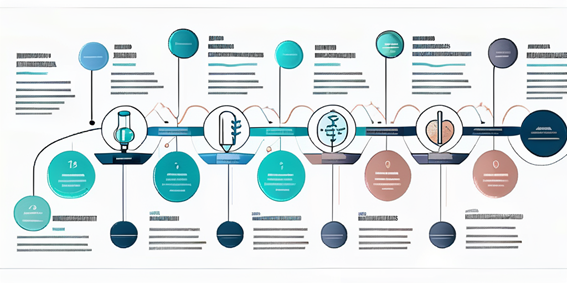In recent years, biopharmaceuticals have emerged as a significant force in the world of medicine. These innovative drugs, derived from living organisms, have revolutionized the treatment of various diseases and opened up new possibilities for patient care. However, the road to success for biopharmaceuticals has been paved with challenges and opportunities. In this article, we will explore the rise of biopharmaceuticals, their impact on modern medicine, their role in precision medicine, their potential in rare diseases, and the future of these remarkable therapies.
The history of biopharmaceuticals dates back several decades, with the development of the first biologic drug in the 1970s. This groundbreaking achievement marked the beginning of a new era in medicine, where the power of biotechnology and genetic engineering would revolutionize the treatment of diseases.

Biopharmaceuticals, often referred to as biologics, are a class of drugs derived from living organisms. Unlike traditional small molecule drugs, which are chemically synthesized, biologics are produced through complex biological processes. These processes involve the manipulation of genes and the use of living cells to produce proteins and antibodies with therapeutic properties.
The advent of biopharmaceuticals brought forth a paradigm shift in the field of medicine. These drugs offer targeted therapies, meaning they act on specific cellular targets in the body. This targeted approach not only increases the efficacy of the treatment but also minimizes the occurrence of side effects. For patients suffering from diseases like cancer and autoimmune disorders, biologics have provided new hope and improved quality of life.
However, the development and production of biopharmaceuticals come with their own set of challenges. The complexity of these drugs requires meticulous attention to detail at every step of the manufacturing process. Any deviation or error in the production can have significant implications for the safety and efficacy of the final product.
To ensure the quality and consistency of biopharmaceuticals, strict regulatory guidelines and quality control measures are in place. These guidelines cover various aspects, including the selection and characterization of cell lines, the optimization of production processes, and the purification and formulation of the final drug product.
In addition to the manufacturing challenges, biopharmaceuticals also face unique regulatory hurdles. Due to their complex nature, the regulatory approval process for biologics is often more rigorous and time-consuming compared to traditional drugs. This is to ensure that the benefits of these innovative therapies outweigh any potential risks.
Despite the challenges, the field of biopharmaceuticals continues to evolve and expand. Advances in technology and scientific understanding have enabled the development of even more sophisticated biologics, including gene therapies and cell-based therapies. These groundbreaking treatments hold the promise of curing previously untreatable diseases and transforming the future of medicine.
In conclusion, the rise of biopharmaceuticals has had a profound impact on the field of medicine. From the development of the first biologic drug in the 1970s to the present day, biologics have revolutionized the treatment landscape for numerous diseases. However, the complexity of these drugs necessitates careful attention to manufacturing processes and adherence to regulatory guidelines. Despite the challenges, the potential of biopharmaceuticals to improve patient outcomes and transform healthcare remains immense.
The introduction of biopharmaceuticals has had a profound impact on modern medicine. These drugs have enabled healthcare professionals to target the underlying mechanisms of diseases, leading to more personalized and effective treatment approaches.
Biologics have revolutionized the management of chronic conditions such as rheumatoid arthritis, Crohn’s disease, and psoriasis. By targeting specific components of the immune system, biopharmaceuticals can mitigate the underlying causes of inflammation and provide long-lasting relief.
Beyond the realm of autoimmune diseases, biopharmaceuticals have also revolutionized the treatment of cancer. Monoclonal antibodies, a type of biologic drug, can specifically target cancer cells or interfere with the signals they rely on for growth. This targeted approach has led to improved outcomes and reduced toxicity compared to conventional chemotherapy.
In addition to their impact on autoimmune diseases and cancer, biopharmaceuticals have also shown promise in the treatment of rare genetic disorders. These disorders, often caused by mutations in specific genes, can result in severe and life-threatening symptoms. Biologics, such as enzyme replacement therapies and gene therapies, have emerged as potential treatment options for these conditions.
Enzyme replacement therapies involve administering a modified version of the enzyme that is deficient or absent in individuals with certain genetic disorders. By providing the missing enzyme, these therapies can help restore normal cellular function and alleviate symptoms. For example, in the case of Gaucher’s disease, a rare genetic disorder characterized by the accumulation of a fatty substance in cells and certain organs, enzyme replacement therapy has been shown to improve organ function and quality of life for affected individuals.
Gene therapies, on the other hand, aim to correct the underlying genetic defect responsible for a particular disorder. This can be achieved by introducing a functional copy of the defective gene into the patient’s cells. The modified cells then produce the missing protein, leading to the restoration of normal cellular function. While still in the early stages of development, gene therapies hold great promise for the treatment of genetic disorders that have previously been considered incurable.
Furthermore, biopharmaceuticals have also played a crucial role in the field of regenerative medicine. Stem cell therapies, a type of biologic treatment, have shown potential for repairing and replacing damaged tissues and organs. Stem cells have the unique ability to differentiate into various cell types, making them a valuable tool for regenerating damaged or diseased tissues.
In the context of cardiovascular diseases, stem cell therapies have been explored as a potential treatment option for repairing damaged heart tissue following a heart attack. By injecting stem cells into the affected area, researchers hope to stimulate the regeneration of healthy heart muscle and improve overall cardiac function. While still in the experimental stage, early studies have shown promising results, paving the way for further research and development in this field.
Overall, the impact of biopharmaceuticals on modern medicine cannot be overstated. These innovative drugs have revolutionized the treatment of various diseases, from autoimmune conditions to cancer and rare genetic disorders. With ongoing advancements in biotechnology, it is likely that the role of biopharmaceuticals will continue to expand, offering new hope and improved outcomes for patients worldwide.
With the advent of precision medicine, biopharmaceuticals have found a natural fit in tailoring treatment to individual patients. By considering the patient’s genetic makeup, lifestyle factors, and disease characteristics, healthcare providers can identify the most suitable biologic therapy for each individual.
Biopharmaceuticals have paved the way for personalized cancer treatments based on specific genetic mutations that drive tumor growth. By targeting these mutations with tailored therapies, precision medicine offers the potential for increased response rates and improved patient outcomes.
The field of precision medicine is continually evolving, with researchers harnessing the power of genomics, proteomics, and metabolomics to develop even more precise and effective biopharmaceuticals.
One of the most promising aspects of biopharmaceuticals is their potential in treating rare diseases. These often-devastating conditions affect a small population but can have a significant impact on individuals and their families.

Biologics offer hope for patients with rare diseases, as they can be designed to target the specific molecular abnormalities underlying these conditions. By addressing the root cause rather than just managing symptoms, biopharmaceuticals hold the potential to transform the lives of individuals affected by rare diseases.
Manufacturing challenges, regulatory considerations, and market dynamics can present hurdles in bringing biologic therapies to the rare disease community. However, collaborations between pharmaceutical companies, patient advocacy groups, and regulatory authorities are working towards ensuring that these transformative therapies reach the patients who need them most.
As we look to the future, the possibilities for biopharmaceuticals are immense. Emerging technologies such as gene editing, cell therapy, and RNA interference hold tremendous promise for advancing the field of biologics.
Gene editing technologies like CRISPR-Cas9 have the potential to correct genetic abnormalities at their source, offering new avenues for treating previously untreatable conditions.

Cell therapy, which involves modifying a patient’s own cells or using donor cells to target diseases, has shown remarkable success in treating certain types of cancer. With ongoing research and development, cell therapy may extend its reach into other diseases, providing personalized treatments that harness the power of the patient’s immune system.
RNA interference, or RNAi, is another exciting field of research that holds potential for the development of targeted therapies. By silencing specific genes responsible for diseases, RNAi-based treatments offer a highly precise approach to addressing the underlying causes of various conditions.
As biopharmaceuticals continue to evolve, researchers and clinicians are focused on ensuring accessibility, affordability, and safety. Regulatory bodies play a crucial role in evaluating the safety and efficacy of these therapies, while manufacturers strive to optimize production processes and manage costs.
In conclusion, the evolution of biopharmaceuticals has brought about immense challenges and opportunities in the field of medicine. Despite the complex nature of these drugs, biopharmaceuticals have transformed the treatment landscape, paving the way for targeted, personalized therapies. With ongoing advancements in technology and research, the future of biopharmaceuticals looks promising, holding the potential to reshape healthcare and improve patient outcomes across the globe.